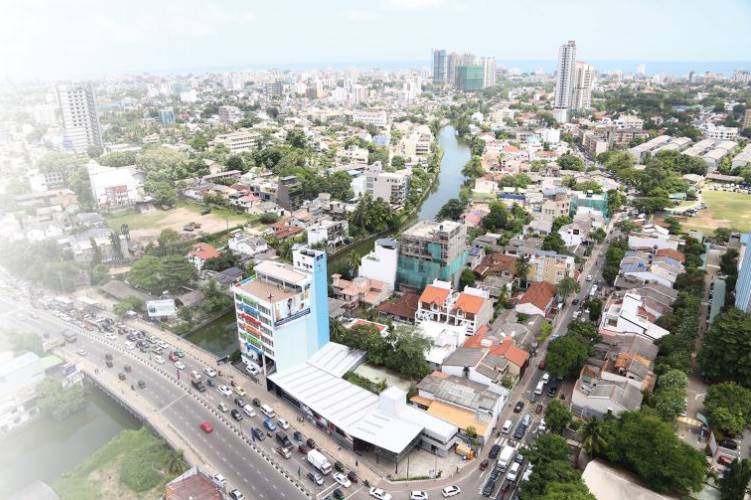A few days back, a news report claiming the detection of a significantly high number of Covid-19 infected persons on a single day from Bandaranayakepura in Colombo triggered alarm bells across the Government and the people, leading to further closures and restrictions of movement.
Amidst fears of rapid community spread of the virus, the blame game started and quickly shifted to the ethnicity of the infected. Slogans such as “oh they are deliberately spreading this” came to be an everyday parlance concealing, in my view, a deeper and a more complex problem that required urgent attention.
It was revealed that as many as 200 persons were living in a sparse space of 15 perches. For us, who tend to take the abundance of space for granted, such overcrowding seems unimaginable. However, overcrowding has come to characterise urban spaces and dwellings even though the issue has attracted little attention of policymakers for years.
Congestion in the Colombo city is the result of large-scale in-migration of persons. This is neither a recent phenomenon nor is it limited to Sri Lanka. Urbanisation was the result of industrialisation and modernisation which started in England and western nations which was soon followed by other parts of the world.
In Sri Lanka, while the level of urbanisation is low compared with other South Asian countries, the worrying fact is the high concentration of such urban population in the single district of Colombo, which inhabits half of the urban population of the entire country.
According to the latest statistics available with the Department of Census and Statistics, Colombo accounts for approximately 50% of the country’s total urban population. Of the Colombo urban population, 44% (15% of country’s entire urban population) is concentrated within the Colombo Municipal Council area within a land mass of 37.3 square kilometres. The population density for Colombo (number of persons per square kilometre) is 3,438 – ten times the average population density for Sri Lanka which is at 325.
The high level of in-migration of persons to Colombo District is due to concentration of economic and administrative centres in Colombo as well as better infrastructure facilities and higher quality of education, healthcare facilities among others.
If one looks at the education sector, in terms of the 2017 data available with the Census and Statistics Department, approximately 10% of the national schools and 50% of the private schools are located in Colombo. The highest concentration of graduates as well as trained school teachers is in the Colombo District.
This demands urgent policy attention to the issue of overcrowding in urban settlements. This is not a charitable end to be pursued but an important right to be safeguarded and realised for the people and society at large.
Even though the Constitution of Sri Lanka does not recognise the right to housing as a fundamental right, the Directive Principles of State Policy enshrined in the Constitution, requires the State to establish a society in which the realisation by all citizens of an adequate standard of living for themselves and their families including adequate food, clothing, and housing is ensured.
The Directive Principles are expected to guide Parliament and the Government in the conduct of government affairs and policy making. Sri Lanka is also a signatory to the International Covenant on Economic, Social, and Cultural Rights (ICESCR) which casts a duty on the State to recognise and guarantee the right to an adequate standard of living including adequate housing (Article 11(1) of the ICESCR). The State parties are required to take appropriate steps to ensure the realisation of this right.
The UN Committee on Economic, Social, and Cultural Rights noted in its General Comment No.4 of 1991, that an important element of “adequate” housing is “habitability”. This means that “housing” contains adequate space and protects the inhabitants from the cold, damp, heat, rain, wind, or other threats to health, structural hazards, and disease vectors and must be able to guarantee the physical safety of the occupants.
International law provides for the progressive realisation of economic, social, and cultural rights. This allows a time dimension for the strategy for human rights fulfilment and setting priorities among different rights, considering trade-offs among them.
Therefore, Sri Lanka can formulate a realistic strategy to achieve the housing requirements of the people informed by the resource availability and prioritisation of needs. However, progressive realisation cannot be used as an excuse for deferring or relaxing its obligations.
Significantly, cities and human settlements play an important role on our path to achieving sustainable development. The 2030 Sustainable Development Agenda focuses on making cities and human settlements inclusive, safe, resilient, and sustainable and towards this end, states are required to ensure access for all, to adequate, safe, and affordable housing and basic services and upgrade slums.
Against this backdrop, the views expressed by President Gotabaya Rajapaksa at a recent meeting with officials, of his intended plans with regard to urban development and construction of houses for, particularly, low-income families, is indeed welcome. Hopefully, the standards relating to “adequate housing” will be considered.
(The Morning)

